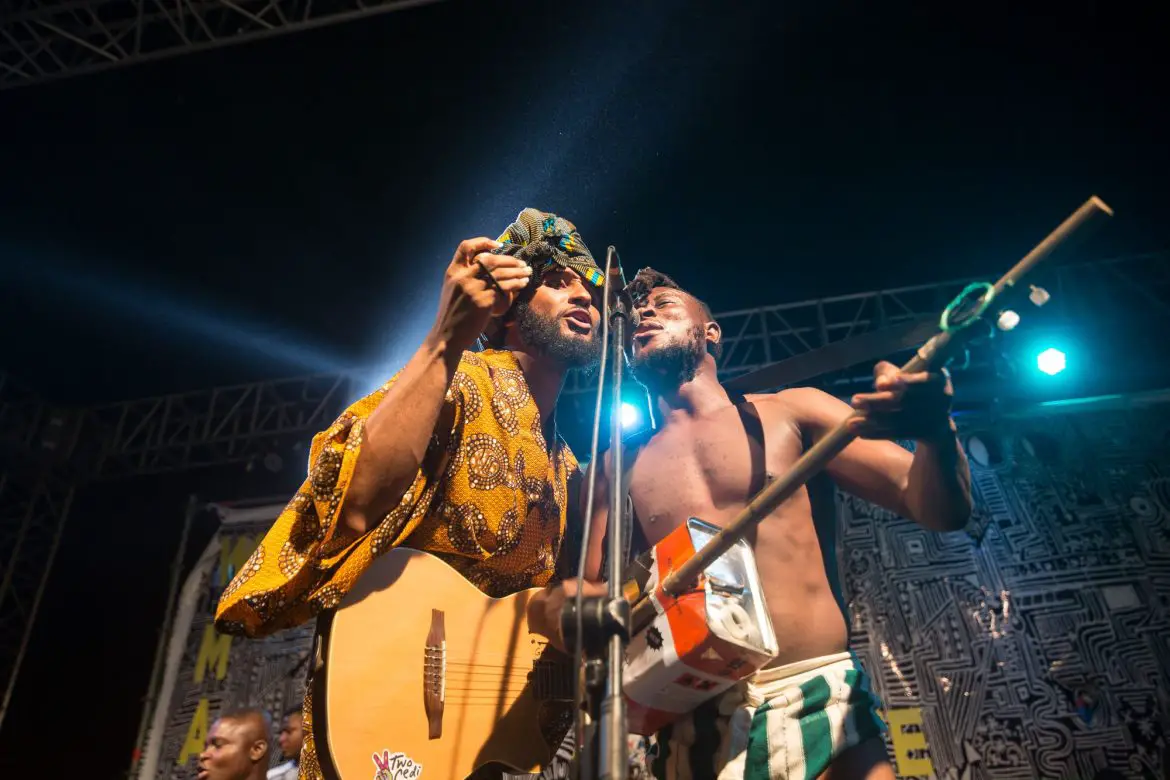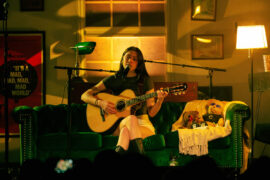Ghanaian band Alostmen’s debut album ‘Kologo’ sees them honour cultural traditions in a 21st Century way.
Stream: ‘Kologo’ – Alostmen
As long as we’ve had civilization, we’ve had music. We discovered fire, the wheel, and rhythm. This is a universal connection across history and time, through our differences and the ages. It’s ingrained in us.
When looking ahead (or even around) is too much, it makes sense many of us find comfort looking backward—
Ghana’s Alostmen have had the same journey, with infinitely better results.

Their debut album, Kologo, sees them honour cultural traditions in a 21st Century way: Ancient instruments—such as the titular kologo, a traditional stringed lute of the semi-nomadic Frafra people—merge with hip-hop. Group chanting and rhythmic bongos round out the sound as it pours through your laptop speakers. It’s an homage and a party rolled into one.
Kologo is so much more than historical references though—it isn’t just folk songs being rehashed for the internet age. Alostmen—started by Stevo and Wanlov the Kubolor—are hell bent on reinventing the instrument. “The kologo is traditionally played a certain way but Stevo will play it at the shortest end of the bridge and accentuate, almost Hendrix-style,” says Wanlov the Kubolor. “He plays with a pedal sometimes and can keep it an octave down with a bass sound. He has evolved the instrument in his own way.”
This is one of the few western influences on the record, however. The modern flairs are more likely to come from Malian rock or reggae rather than anything that’s found on the Top 40. Hints of Oumou Sangare come in the tender moments, while the hypnotic nature of Kologo‘s riffs is reminiscent of Mdou Moctar. Even the moments of hip-hop feel like an African take on an American idea, with the backing instruments being a goje (two-string fiddle), flutes and a percussive assortment of gome box, djembe and conga. Where Songhoy Blues took Malian rock and westernized it, Alostmen have leaned into their Ghanian heritage, forgoing Western instruments—and in particular electronic beats—to keep an authentic sound.
While solo tracks like “Bayiti” draw the Ali Farka Touré comparisions—and rightly so—the album’s brightest moments are when the whole band gets involved. “Atubga” shows this spirit in spades. With the kologo laying down the consistent rhythm, it allows the other instruments to provide layers of competing melody over the top. Stevo’s vocals provides a wall of sound, a constant flurry of Frafra— a Guruna language—which leaves you humming for days. Seemingly without a chorus, it’s a constant stream of consciousness that leaves its mark on your ears and your repeat button. Like most of the album, the pared-down instruments make the tracks sound straightforward upon first listen, but multiple spins show a complexity and depth that you can—and should—spend hours mining.
Alostmen’s daring Kologo takes the old and makes it new again, looking to the past to foster and create a sound uniquely 2021. It’s a celebration of African music by Africans—the rest of us are just lucky to listen.
— —
:: stream/purchase Alostmen here ::
— — — —

Connect to Alostmen on
Facebook, Instagram
Discover new music on Atwood Magazine
? © © Abass Ismail
:: Stream Alostmen ::








